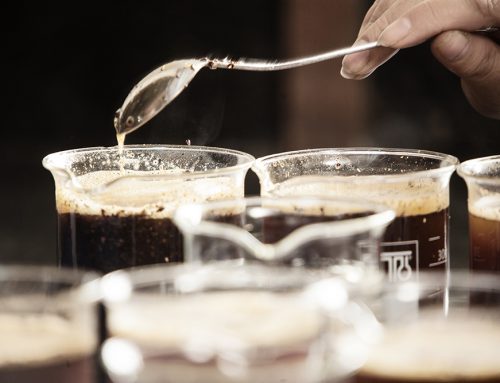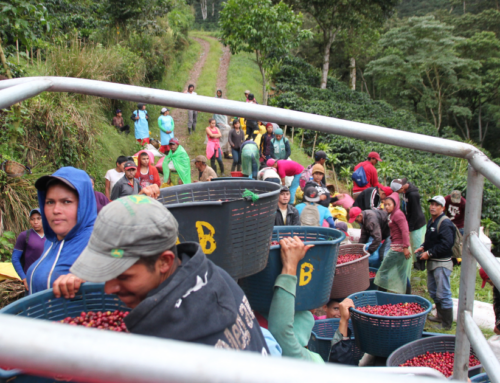Procesadora del Sur, Genuine Origin’s sister company in Peru, is celebrating the first anniversary of its new green coffee mill in Jaén, in the Cajamarca coffee region in northern Peru. The dry mill processes coffee for thousands of individual producers. At full capacity the mill can turn out nearly 7000 bags of green coffee beans per week. We talked to Javier Chávez (pictured below), Assistant General Manager for Procesadora del Sur about the mill, fresh crop Peru coffees and how the team is coping with the COVID-19 pandemic.

Javier Chávez, AGM Procesadora del Sur
Genuine Origin (GO): Overall, how is the Jaén Mill doing one year on from opening?
Javier Chávez (JC): The mill has been operating as per plan – the design has allowed us to capitalize on many efficiencies that were not possible given the facilities we had at our disposal previously. We are seeing a boost in capacity and, as a result we are better able to compete in the area, and in the country.
GO: What processes are currently carried out at the Mill?
JC: It’s a dry mill with a drying station and a storage capacity for over 90,000 bags of green coffee. We can process the equivalent of 1,400, 69 kilo bags of exportable coffee per day in a 24-hour shift. These shifts operate three to four months per year, starting in June.
In addition, we can dry more than 20 metric tons of parchment per three-to-four-hour shift. This is an important service for us to offer our producers given that there is a significant overlap between the harvest and rainy season in Jaén. This is the most important step in our QC process at production: when done wrong, coffee that would otherwise sell in the highest quality markets is damaged and downgraded. We have also installed drying bed capacity and have made them available to Volcafe Way producers -free of charge. In doing so we are attempting to tackle a persistent challenge in quality control at the farm level – getting farmers more money for their coffee. We also want more producers to see the tangible benefits and the long-term value of the Volcafe Way program.
GO: What’s unique about the Jaén Mill?
JC: First of all, its location is strategic given that it sits smack in the middle of one of the biggest, fastest-growing, coffee-producing regions of Perú. Jaén is well-positioned to process coffee locally and from remote agricultural regions such as the Upper Mayo River Valley. It is also easily connected by road to the ports of Paita and Callao. It’s 10,000 m² and close to the airport of Jaén (Shumba) in the heart of the northern Peruvian coffee district. The mill is becoming the top pick for many producers and merchants.
GO: How do your employees feel about working at the Mill? What are the best things about working here?
JC: The dedication and commitment of our staff to our values is always on view. This is, after all, a coffee region and coffee permeates every level of our team with great pride, from our field technicians in charge of deploying and advancing our Volcafe Way program, to our GM – who is a coffee farmer himself! Coffee brings us together. On top of that it’s hard to imagine a more pleasant working environment. We’re in a state-of-the-art, modern facility surrounded by lush greenery.

Sorting at the Jaen Mill
GO: How is it working with the wider community in Jaén? Is it now fully established on the coffee scene there?
JC: We’ve had a presence in Jaén for many years. So, this was a change for producers who used to deliver to our “old” location. Given where these producer travel from, for them we have kept space in town to accommodate their needs, that is ultimately our added value, accommodate our producers. Producer focus comes first, second and third in our priority list!
GO: Has anything changed since you opened?
JC: We have doubled down on our commitment to Peruvian growers and on being an active part of the community. The Volcafe Way program allows us to make real, tangible progress that, year over year, is resulting in the progressive empowerment and lifting of people´s well being.

Outbound coffee
GO: How has corona virus affected the Mill?
JC: Peru was hit by the COVID-19 and we were subject to all the disruptions. We implemented the most informed procedures we could in order to care for our team members first, and business second. As of the time of this writing, many people still can´t move about freely. There’s a ton of brainstorming going on in order to figure out the best ways to address the issue, and service our committed producers. We are all working hard to mitigate, and if possible negate, the negative impact of this situation for them.
Our strong relationships show their value amidst all the uncertainty and we are confident that our approach is going to pay strong dividends not just in terms of the balance sheet, but holistically, ensuring that Volcafe remains a proud and productive member of the Peruvian coffee community.

Receiving coffee at the Jaen Mill
GO: How are the coffees in Cajamarca tasting this year? Any special tasting notes? Is there anything different and, if so, why?
JC: Coffee’s in the Cajamarca region are cupping really well this year! The crop received good rains at the right time. This should bring out some lovely notes – especially in the higher elevation areas in 1,300+ masl. This will also increase quality and competition to get these coffees.
GO: Some of your coffees are going to be on the Genuine Origin site this year (hopefully a lot!). Can you speak about how you are sourcing and prepping these lots? Will it be processed by the Jaén mill?
JC: The preparation of these lots is an amazing, concerted effort involving everyone in the organization. Even Harry Odio, our General Manager, is heavily involved in quality control. The most important steps in prepping the GO lots are: controlling quality at the mill and the communicating with producers. Our field technicians make frequent farm visits to monitor processes and help ensure quality.
GO: Can you tell us approximately how many farmers you are serving at the Jaén facility? Can you talk about how the new facility enhances/impacts specialty coffee?
JC: At the Jaén mill we currently serve over 2,500 producers. We are proud of the relationship and the trust they place in us. Whenever we receive coffee it’s another chance for us to give feedback and give producers actionable steps to get them moving on a path of improvement. We also offer them access to drying beds in our facilities. This helps farmers learn best practices and see how much of an impact an investment in a sun-drying bed can have for their business. It’s also another way of demonstrating our commitment to them and making that relationship stronger.






